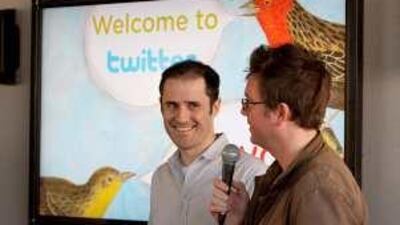Every night, Roy Choi drives his kitchen van around the bustling streets of Los Angeles, stopping frequently to sell gourmet Korean-style meat tacos to a hungry crowd. Instead of relying on print or even word of mouth marketing, Mr Choi publicises his up-to-the-minute whereabouts using Twitter, the micro-blogging phenomenon that permits users to send messages of up to 140 characters to more than 14,000 people.
The result has been remarkable. Instead of struggling to make ends meet in a crowded market, Mr Choi now is greeted by queues wherever he stops. "As a chef, I always think it's the food. But I think without Twitter it wouldn't be anything because I could have made these tacos, but I would have had no one to sell them to," he told the US National Public Radio. The irony is that while Mr Choi has found a way to cash in on Twitter, the service itself has yet to really reap the financial benefits of its own popularity. It seems to be everywhere. Last year's "next big thing" was Facebook. But almost overnight, Twitter has usurped its place to become today's web darling. Celebrities, news organisations, sport superstars and politicians have all flocked to the service in an effort to break down layers of communication to reach people directly.
Some have opined that Twitter's popularity can loosely be linked to Descartes' "I think, therefore I am" philosophy, where humans can take comfort in knowing that someone halfway around the world knows what inane event they have decided to shout into the cybercloud. Indeed, the system's addictiveness can further be ascribed to its sense of urgency which leads to greater information dissemination, instantly formed conversations and hectic news gathering.
Over the past year, Twitter has seen its usage explode around the world, growing at a staggering 1,382 per cent in the US and 1,810 per cent in the Middle East as of February, according to data from Nielsen Online and Comscore. Admittedly, this was from a low base. Nevertheless, more than 7 million active users around the world now post their "tweets" for all to see. But even if you have the hottest property on the web, the people behind Twitter still haven't made a profit since the service launched in 2007. Many have speculated that Twitter would create premium features for users, special advertising messages or company-specific accounts to raise revenue. Its founders, Evan Williams and Biz Stone, have promised they will announce something later this year.
One option it has pursued is a service called "Exectweets", created in partnership with the software giant Microsoft as a resource to follow top business executives on Twitter. The service, with advertising backing from Federated Media, holds some promise but it will certainly fall far short of covering any capital or operational costs to run the service. But working with Microsoft could become the first step into a lasting relationship for Twitter. Microsoft employees apparently like Twitter enough that they do not hesitate to incorporate it into their presentations or upcoming software releases. Microsoft already has demonstrated it is serious about getting into online social networking by spending US$240 million (Dh881.5m) last year to take a 1.6 per cent stake in Facebook. The software giant has $8.8 billion in cash, so further investments in the space would not be out of the question.
Google is considered another possible investor in Twitter. Henry Blodget, a former stock analyst, wrote on his Silicon Alley Insider website that the search engine giant should buy Twitter for $1bn without hesitation. The reason? With so many messages being sent every second, it is relatively easy for Twitter to find out what topics are being mentioned in real-time. Embedding this feature into Google's search engine would allow it to connect those topics with its online advertising division to create highly relevant and effective ads. Besides, it probably would be the first company that would have two new-language verbs - "google" and "tweet" - as part of its business.
Whichever direction Twitter chooses, users in the Middle East would be wise to strike while the iron is hot. It would be useful to quickly determine how to use the service to reach out to customers, to form collaborative efforts with Twitter and its users and so on. While Arabic-language Twitter-like programmes, such as Watwet and ArTwitter, are available, they fail to carry Twitter's brand and cachet.
According to Comscore, there are about 376,000 Twitter users in the Middle East. It is possible that millions more might join, given how the popularity of mobile-text messaging in the region could easily be shifted towards the service, in line with the rise in sales of robust, multimedia-rich smartphones. Telecommunications companies such as Etisalat and du might want to investigate how the popularity of a mobile phone-based Twitter service could add to their already growing revenue streams. If there is any money that could be siphoned off a potential online juggernaut, Middle-Eastern entrepreneurs should be already thinking of ways to connect the Arab world to the Twitter brand.
Twitter's time in the sun is now and its popularity will not last forever. Eventually it will find a way to make money, either through its internet business development plans or from a corporate takeover. In the meantime, businesses might want to consider how to get on-board the 140-character message machine, or get left behind. dgeorgecosh@thenational.ae

